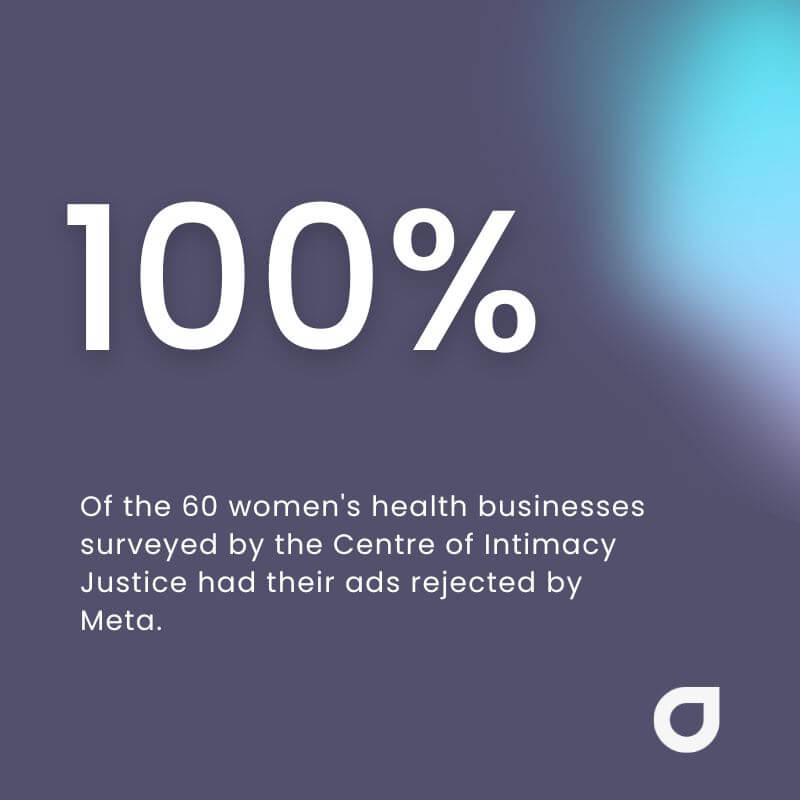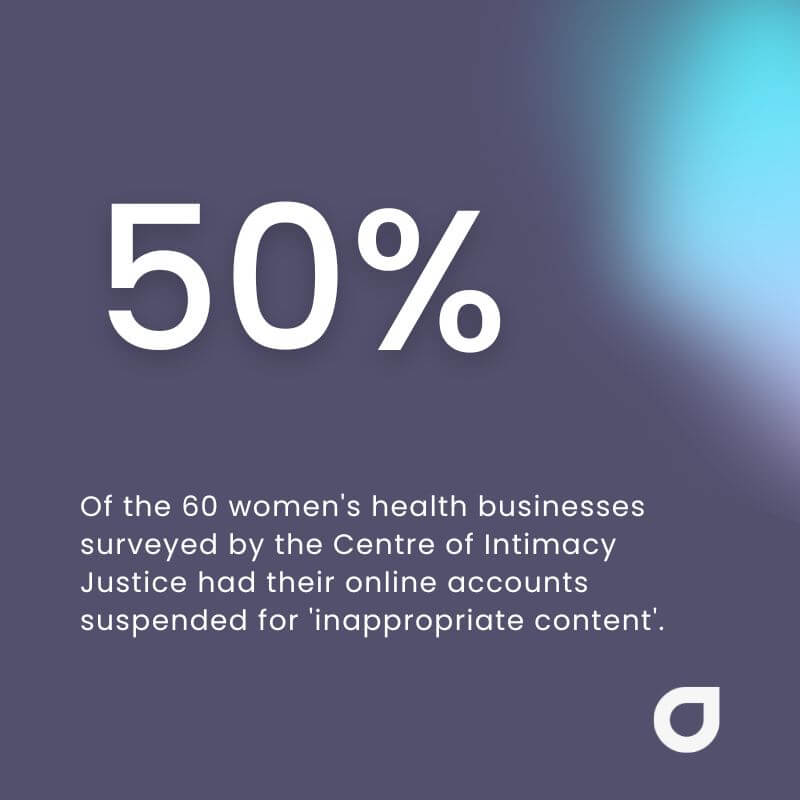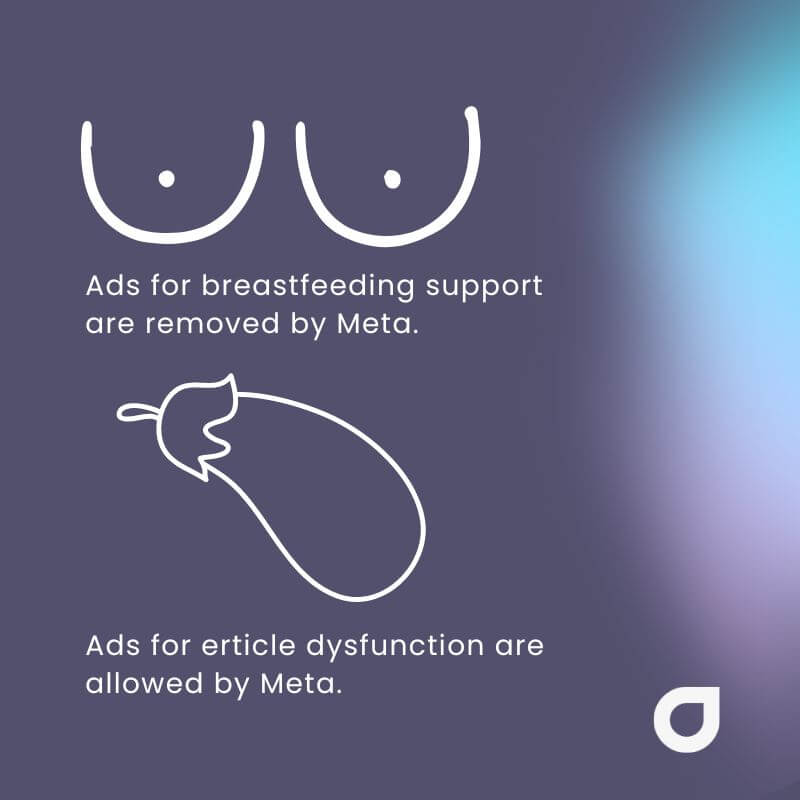5 mins read
Women’s Health Is Being Censored

Online platforms have provided spaces for women’s health discussion and development. But what happens when educational health content is sexualised and censored by these platforms?
In this article, we explore how the censorship of women’s health content online impacts women everywhere.
Who is being censored?
In January 2022, the Centre for Intimacy Justice (CIJ) published a report surveying 60 businesses that serve the health of women and people of diverse genders. These businesses spanned multiple categories including menopause, pelvic pain, pregnancy, postpartum care, menstrual health, fertility, sexual wellness, health education and more.

What the survey found was shocking. Of these 60 businesses, 100% had an advert rejected by Facebook or Instagram – with 50% having had their entire accounts suspended for ‘inappropriate content’ at some point.

Why does it happen?
Historically, women’s bodies have been sexualised by society. This sexualisation means that health education and content related to women’s bodies are deemed inappropriate for online platforms. The CIJ report showed that Meta would classify women’s health content as ‘adult products or services’, violating their community guidelines.
Online censorship is gendered
Whereas content containing basic health information or products aimed at women is heavily censored by social media platforms, companies promoting male sexual wellness are free to advertise as they please. For example, one advert offering breastfeeding support was removed by Meta, whereas another advert promoting a product for erectile dysfunction in an openly sexual way received no censorship at all.

Why are online spaces important to women’s health?
Women’s health topics have long been surrounded by shame and stigma, creating knowledge gaps for women and girls. In the past decade, online platforms have allowed women to discuss health experiences in ways they may not feel comfortable exploring in typical social settings. Therefore, online spaces have allowed more conversation about women’s health, leading to better education and more innovation in products and services. These spaces are valuable to women’s health development – but censorship poses a threat to this progress.
How have things changed?
Following the publication of the CIJ report and advocacy from across the women’s health sector, Meta updated their community guidelines in 2022. The new guidelines allow content on reproductive health products or services (in theory) – but the content must be targeted at people aged 18 or above and must not focus on sexual pleasure.
How do the new guidelines impact women?
Although these new guidelines are a step in the right direction, the CIJ highlighted the limitations of the updated policies.
- Excluding people under 18 from viewing health content perpetuates the sexualisation of women’s bodies and associated content being considered ‘adult’. This also prevents young people from accessing important health education online when navigating puberty – a time when so many young people have an abundance of questions about their bodies.
- Prohibiting content from focusing on pleasure minimises women’s experiences of sex and isolates entire categories of products from advertising. Without open discussions on pleasure, it’s very difficult to promote sexual well-being or have meaningful conversations around consent.
Reasons censorship needs to change, according to the CIJ:
- Access to sexual health information will benefit women and people of diverse genders.
- Improving women’s economic power and equality.
- Technological advancement and investment in female-founded business.
- Building a culture of equity and well-being in intimacy.
Let’s delve in a little deeper.
- Access to sexual health information will benefit women and people of diverse genders.
The internet has democratised information on a mass scale. It can be a powerful tool when it comes to learning about your body and taking action towards better health. Young people in particular are more likely to use social media for research than traditional search engines. This means that platforms have a responsibility to ensure they are allowing access to essential health information and spaces for women to feel supported in their health journeys.
- Improving women’s economic power and equality.
The CIJ report found that all but one of the companies experiencing censorship were female-founded and led, with one company led by a non-binary person. This is significant because it means that women’s businesses are being unfairly targeted by online censorship. The repercussions of this can be widespread – with censorship not only impacting the gender health gap but the gender pay gap, too.
- Technological advancement and investment in female-founded businesses.
Today, so much of a business’s success depends on the growth of its online presence – which means visibility is more important than ever. If women’s health companies can’t grow their audiences, how are they expected to gather support and receive investment to improve their products and services? Male-owned companies focusing on male health are able to freely advertise sexual content online, allowing them to grow faster and profit more than female-owned companies.
- Building a culture of equity and well-being in intimacy.
Censoring basic health information and products reinforces the idea that women’s health experiences are shameful and private issues, rather than a completely natural and normal part of life. Social media platforms have a unique opportunity to challenge this narrative by promoting a culture of equity and well-being when it comes to intimate topics.
Forth promote open and honest conversations around women’s health.
Here at Forth, we’re all about supporting women to have open and honest conversations about their health experiences. We believe in the power of education to empower women to take control of their well-being, which is why we stand against the censorship of women’s health online. For more information on how Forth can support you – check out our Health Hub.
This information has been medically reviewed by Dr Thom Phillips
Thom works in NHS general practice and has a decade of experience working in both male and female elite sport. He has a background in exercise physiology and has published research into fatigue biomarkers.

Dr Thom Phillips
Head of Clinical Services
Related articles
Like this article? Here are some more based on similar topics.



